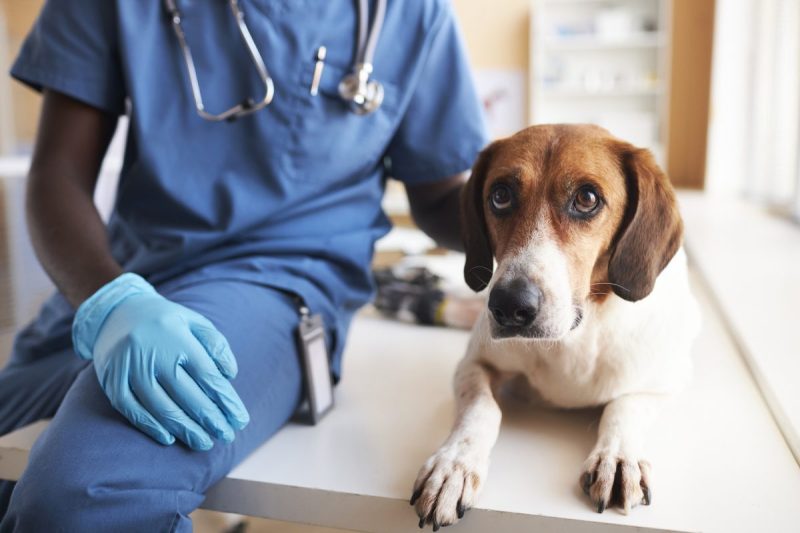Enlarged prostate in dogs, also known as prostatomegaly, is a condition that can affect any male, though it is more common in dogs who haven’t been neutered and dogs over the age of eight.
Usually it’s benign and only causes minor issues, if any at all. However, an enlarged prostate can result from very serious, even life-threatening, conditions such as cancer, too.
The prostate gland is between the bladder and rectum, and when it becomes enlarged, it can cause problems with urination or defecation. If you see the signs of an enlarged prostate in your dog, then you must consult your veterinarian so they can form a proper diagnosis and prescribe treatment.
Here’s what you should know about the symptoms, causes, and treatments for enlarged prostate in dogs.
Symptoms Of Enlarged Prostate In Dogs
The symptoms of enlarged prostate in dogs can vary depending on the cause of the condition or how it affects the surrounding organs.
Some dogs don’t experience any pain or symptoms at all. When that is the case, the enlarged prostate may be discovered during routine veterinary check-ups. Other dogs present obvious symptoms and experience severe pain.
If your dog experiences the following symptoms of enlarged prostate, even mildly, you should consult your vet:
- Signs of pain during urination or defecation (yelping, straining, etc.)
- Signs of pain while walking (stiff movements, short steps, etc.)
- Constipation
- Unusual, ribbon-like stools
- Blood in urine or bloody discharge from urethra
- General signs of pain
Causes Of Enlarged Prostate In Dogs
There are three main causes of enlarged prostate in dogs.
Benign prostatic hyperplasia (BPH) is the most common form of prostate enlargement, and it happens naturally as part of the aging process in male dogs who haven’t been neutered. It doesn’t happen in neutered dogs. This type may cause benign cysts, and it may put pressure on surrounding tissue and organs, causing discomfort and symptoms.
Bacterial infection of the prostate, also known as prostatitis, is the second most common cause of enlarged prostate in dogs. Infections can be acute, meaning they appear suddenly and severely, or chronic, meaning the infection develops slowly over time. They can lead to abscesses, or pockets of pus, in the prostate.
Bacterial infection can cause several other symptoms, too, such as fever or illness.
Prostate cancer is the other main cause of enlarged prostate in dogs, and it is relatively rare, making up less than ten percent of enlarged prostate cases. There are several types of cancer that affect the prostate that can either originate within the gland, itself, or metastasize and spread to the prostate from elsewhere in the body.
Prostate cancer is likely to metastasize and affect other areas of the body, such as the kidneys, liver, lungs, other organs, and bones.
Treatments For Enlarged Prostate In Dogs
The treatment for enlarged prostate in dogs depends on the cause of the condition.
For benign prostatic hyperplasia, treatment usually includes neutering, which forces the prostate to shrink on its own and reduces symptoms. If cysts have appeared, they may be drained surgically.
Bacterial infections are usually treated with antibiotics. If the infection is chronic, treatment may include injections, enemas, and surgery because medications often cannot penetrate the barrier between the blood and prostate gland. Abscesses will have to be surgically drained.
Prostate cancer is very difficult to treat, and there is no cure. Radiation therapy may help relieve pain and some symptoms, and it is possible for the cancer to go into remission. You should discuss treatment options with your veterinarian and determine what is the best course of action for your dog.
Have you neutered your dog to reduce the risks of prostate conditions? How do you keep your male dog healthy? Let us know in the comments below!

